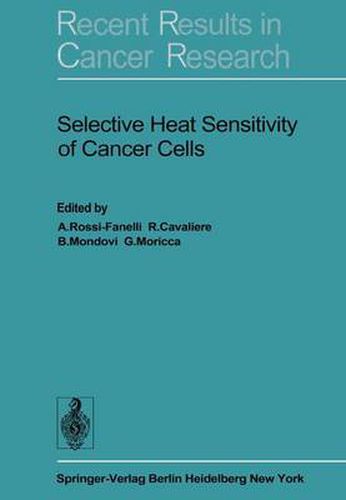Readings Newsletter
Become a Readings Member to make your shopping experience even easier.
Sign in or sign up for free!
You’re not far away from qualifying for FREE standard shipping within Australia
You’ve qualified for FREE standard shipping within Australia
The cart is loading…






This title is printed to order. This book may have been self-published. If so, we cannot guarantee the quality of the content. In the main most books will have gone through the editing process however some may not. We therefore suggest that you be aware of this before ordering this book. If in doubt check either the author or publisher’s details as we are unable to accept any returns unless they are faulty. Please contact us if you have any questions.
Since the first observations of Busch in 1866, the possible use of heat as a therapeutic agent in the cure of cancer has been repeatedly subject to bursts of interest, almost invariably followed by periods of neglect and skepticism. In 1963-1964, this problem was again attacked by us both from the biochemical and from the clinical points of view. The first results of this joint effort were positive beyond expectation, and generated a new revial of studies aimed at the identification of the nature of the bio chemical lesion as well as at the optimization of technique and of the therapeutic schedules connected with clinical use. Although the number of mammalian tumors which have been proved to be heat-sensitive is now relatively large, and although in some cases a correlation has been demonstrated between tumorigenicity and heat-sensitivity of in vitro cultured cell lines, the question of a direct and constant relationship between neoplastic character and higher sensitivity to hyperthermic exposure is still open to continuing investigation and reappraisal. Several studies deal in fact with the determination of the conditions under which, in vitro and or in vivo, different tumors are efficiently damaged by elevated temperatures.
$9.00 standard shipping within Australia
FREE standard shipping within Australia for orders over $100.00
Express & International shipping calculated at checkout
This title is printed to order. This book may have been self-published. If so, we cannot guarantee the quality of the content. In the main most books will have gone through the editing process however some may not. We therefore suggest that you be aware of this before ordering this book. If in doubt check either the author or publisher’s details as we are unable to accept any returns unless they are faulty. Please contact us if you have any questions.
Since the first observations of Busch in 1866, the possible use of heat as a therapeutic agent in the cure of cancer has been repeatedly subject to bursts of interest, almost invariably followed by periods of neglect and skepticism. In 1963-1964, this problem was again attacked by us both from the biochemical and from the clinical points of view. The first results of this joint effort were positive beyond expectation, and generated a new revial of studies aimed at the identification of the nature of the bio chemical lesion as well as at the optimization of technique and of the therapeutic schedules connected with clinical use. Although the number of mammalian tumors which have been proved to be heat-sensitive is now relatively large, and although in some cases a correlation has been demonstrated between tumorigenicity and heat-sensitivity of in vitro cultured cell lines, the question of a direct and constant relationship between neoplastic character and higher sensitivity to hyperthermic exposure is still open to continuing investigation and reappraisal. Several studies deal in fact with the determination of the conditions under which, in vitro and or in vivo, different tumors are efficiently damaged by elevated temperatures.